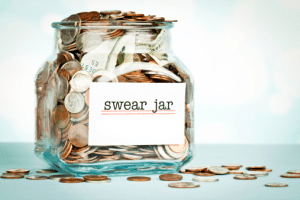
**Warning: Mild profanity ahead. If minor curse words offend you, you may want to stop reading now. Consider this your Ozian “I’d turn back if I were you” sign.**
Last week we hosted one of our new favorite authors, Josh Bernoff, on our #WriteOn webinar series. His bold session How to Stand Out by Writing Without Bullshit was historic for WriterAccess in many ways.
- We broke our record for webinar registrations well exceeding the 1,000 mark.
- We broke our record (and industry standard) for attendance rate with a whopping 40%.
- And we accomplished all this by using profanity in our email marketing.
You may be asking yourself why we would even risk offending people by using curse words when we can avoid it altogether with inoffensive synonyms, abbreviations, or symbols. We asked ourselves that same question. After much back-and-forth, research, and testing we came to the conclusion that the potential benefits of using this intentionally bold language would far outweigh the cost of losing a few supporters.

At WriterAccess we don’t take language lightly. So we defined a process to scientifically confirm whether or not we should use mildly offensive language in our content. First step, research.
There is a surprisingly low amount of literature to either support or warn against using curse words in email copy. One expert would warn not to risk it, another would say dropping mild curse words like “hell yeah” would get big clicks. Few were supported by data. We left feeling that ultimately profanity is polarizing; some connect with the gutsy language and appreciate the authenticity while others are completely ostracized and outraged. Not much help there.
Next step, A/B testing. Internally we were split – curse words could lead to an increase in spam complaints, unsubscribes, and negative responses. But if it was critical to the message it might connect with the right audience and lead to an increase in conversions. If the vast majority of our audience was ok with this bold language and if it had a positive impact on registrations then it could be worth the tradeoff of losing a few supporters. (And if we lost them over a minor language choice, were they really supporters in the first place?)
The test compared using the curse word bullshit (version A) to a control with no profanity that instead included the abbreviation BS (version B). We kept the word in question solely in the body of the email and out of the subject line.
With a sample size of 88k it was easy to see statistical significance. Version A (bullshit) led to a 15% increase in both clicks and conversions with no increase in unsubscribes and zero spam complaints. Version B (BS) had fewer clicks, fewer conversions, and resulted in several spam complaints.

Apparently you can stand out by writing with bullshit.
In the end we set a new company record for webinar registrations, an all-time high attendance rate, and kept our unsubscribe rate low.
We had a small handful of personal negative replies, but it was far less than 1% of 1% of all email recipients (.002% to be exact). Not a concerning loss.
Ann Handley talks about being big, brave, and bold with your content marketing. You’re not trying to reach everybody and your marketing shouldn’t cater to everyone. Authentic and intentional content marketing should tell a story that hits on the specific challenges of your audience. Marketers should challenge the status quo with a voice that is a differentiator in a sea of mediocre content. And this gutsy language will ultimately connect with your audience at a deeper level and convert them into your squad.
Like Josh Bernoff’s advice, you want to stand out with your writing: “90% of content marketing is bullshit. You want to write the 10% that isn’t”. (Follow Josh on Twitter)

Ultimately we decided that the word bullshit was central to Josh’s message and beating around the bush with abbreviations or inoffensive synonyms simply wasn’t as compelling. As long as our language choice wasn’t for shock value and was critical to the message – a message that speaks to the unique challenges faced by our audience – the majority of our supporters would recognize this and be drawn in by it.
In the end, bullshit wasn’t the worst word we could use. It’s not derogatory and it’s not even a 4-letter word. It’s animal feces. Gross, and a little inappropriate for professional communication, but not awful. (Plus it’s in the title of Josh’s upcoming book)
There are other ways to stand out in your writing without using profanity. Here’s Josh’s top 4:
- Remember that people read on screens
- Treat the reader’s time as more valuable than your own
- Be short, clear, bold, and front-loaded
- Build time to prepare, write, and edit – but don’t lose the soul
Our takeaway from this experiment is that our messaging won’t connect with everyone, but if it’s authentic it will connect with the right audience. By being brave and bold in our content marketing we will actually convert more of those right people into our squad. With intentional language that is authentic to the soul of WriterAccess and speaks to our unique audience we will stand out and exceed our goals.
I don’t anticipate using more profanity in our email marketing anytime soon, I don’t have a particular reason to. But next time I won’t be afraid. I can write boldly and expect high results from our brave and thoughtful content marketing.
Catch the replay of Josh’s record-breaking webinar “How to Standout by Writing Without Bullshit”.






